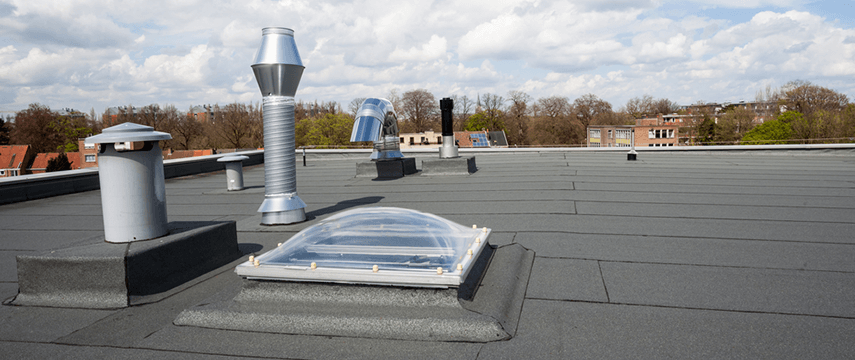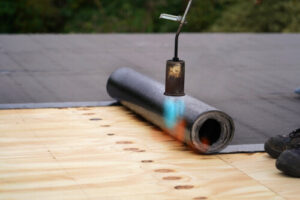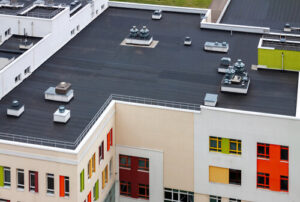You can learn a lot about someone by looking at their roof. In the commercial space, flat roofs are the norm, but with so many systems out there, it can be hard to understand the best option for you and your business. We’ll cover everything you need to know before your next construction project in our guide to commercial flat roofing.
Flat Roofs: The Basics
Flat roof systems are the alternative to traditional pitched roofs that we see on houses, but they are not totally level. To help with drainage, they have a slight pitch, usually less than 10 degrees. The residential roof options that we know and love, like asphalt shingles, aren’t meant to handle sitting water, so flat roofs require different solutions to stay watertight.
Flat and low-slope roofing systems can be made from a variety of materials, from rubber and plastic to roofing felt and chemical foam. The best system for your business will depend on several factors:
- What you use the building for
- Budget
- Climate conditions
- Rooftop traffic
Types of Commercial Flat Roofing
There are several different commercial roofing options to choose from.
Built-Up Roofing (BUR)
Before the development of membranes and modified bitumen, built-up roofing was the most common system for flat roofs. Also known as tar-and-gravel, BUR systems are made by layering bitumen (a black substance made from tar or asphalt) and roofing felt over the roof deck and insulation.
These alternating layers help strengthen and waterproof the roof. They can be applied cold with adhesive or hot with a torch. Lastly the roof is topped with gravel to protect it from physical damage.
Fast Facts:
- Fireproof
- Low-maintenance
- Easy to remove layers when repairing
- Slow and difficult to install
- Very heavy
- Not flexible in the cold
- Can last up to 20 years
Modified Bitumen (MB)
Also called mod bit, this is a more modern, cost-effective version of built-up roofing. This system incorporates layers of modified bitumen membranes that have been reinforced with fiberglass or polyester. It comes in rolled sheets that can be applied hot or cold.
It is a flexible, versatile, and durable roofing system that is easier to install and extremely weather and temperature resistant.
Fast Facts:
- Lighter weight than BUR
- Easy installation
- Flexible in cold temperatures
- Low-maintenance
- Most membranes can be recycled
- Less attractive than those with a gravel coating on top
- Can last up to 20 years
Thermoplastic Polyolefin (TPO)
Thermoplastic Polyolefin (TPO) involves a single-ply membrane made of a mix of plastic and rubber. The membrane is attached to the cover board either mechanically or adhesively, and then the seams are welded together.
As one of the fastest growing roofing systems, TPO roofs are flexible, lightweight, and weatherproof! They usually come in light colors, allowing them to reflect heat and lower your cooling bill. However, the lighter colors also show more dirt and wear.
Fast Facts:
- Easy to install
- Reflects UV rays
- Weather resistant
- Gives you more insulation options
- Membranes are vulnerable to punctures
- Seams are common locations for leaks
- Can last 20-30 years
Polyvinyl Chloride (PVC)
PVC roofing is made of a synthetic plastic that has been reinforced with fiberglass and polyester. Similar to TPO, the top layer is a white single-ply membrane that reflects heat and is welded together at the seams. It’s a great option for commercial flat roofing because it is resistant to chemicals, grease, fire, and punctures.
Of all the single-ply roofing systems, PVC is the only one that is resistant to chemicals. This makes it an exceptional choice for restaurants or food courts due to its ability to handle grease build-up.
Fast Facts:
- Energy efficient
- Easy to install
- Very durable and flexible
- Resistant to chemicals and grease
- Typically more expensive than other membrane roofing systems
- Manufacturing process can be bad for the environment
- Can last up to 30 years
Ethylene Propylene Diene Monomer (EPDM)
Also called rubber roofs, EPDM roofs are made of a rubber membrane derived from oil and natural gas. The membrane comes in large sheets that can be fastened or glued to the roof deck and is known for its strength and durability. They come in black or white, and are typically longer lasting than other roof systems.
Fast Facts:
- Lightweight
- Easy to install and repair
- Depending on color, can lower heating or cooling bills
- Membranes are vulnerable to punctures
- Seams are common locations for leaks
- Can last for 40+ years
Spray Polyurethane Foam Roofing (SPF)
Unlike the other roofs we’ve discussed, spray polyurethane foam-based roofing is done with two liquid chemicals — isocyanate and polyol. These are applied with heat and pressure to form the foundation of the system, and then you add a protective layer over the foam.
This seamless roofing system is waterproof and airtight, allowing you to seal hard-to-reach places. It provides fantastic insulation far above any of the other roofing materials. It is also an environmentally friendly option because you can install them over your existing insulation.
Fast Facts:
- Energy efficient
- Provides great insulation and a sound barrier
- Less leaks
- Easy to install
- Requires regular maintenance
- Chemicals can be potentially harmful
- Can last up to 50 years
Metal Roofing
Commercial metal roofs are known for their durability. They can last as long as the building they’re on! The metal panels can be made from steel, copper, aluminum, or zinc, and they come in a variety of colors and styles to match your taste.
Metal roofs are a great choice because they won’t crack, chip, or warp, and they are fire-resistant. Since metal is stronger than single-ply membranes, this is the most low-maintenance option. However, they are very expensive upfront, and you might have to worry about corrosion and noise, especially during high winds or a hailstorm.
Fast Facts:
- Durable
- Low-maintenance
- Reflects heat
- Recyclable at the end of their lifespan
- Visually appealing
- More expensive upfront
- Installation requires specialized equipment
- Loud
- Can last 50+ years
Benefits of Flat Roofs
While pitched roofs typically last longer and have better drainage, there’s a reason most businesses opt for a flat roof.
1. Smooth Installation
Flat roofing systems make the installation process so much easier! Whether you’re spraying or rolling out sheets, installing a flat roof can happen in the fraction of the time it would take to do a sloped roof. This also benefits your wallet.
2. More Storage Space
A lot of businesses choose to put their HVAC unit or other large equipment on their rooftop. You can also get creative and create a rooftop garden, patio, green roof, or solar panel display. Overall, flat roofs give you more space to work with on your property.
3. Energy Efficient
Many commercial roofing options are reflective and can help keep the utility bills down. In addition, cool roofs help your HVAC not have to work as hard, so it will last longer. As mentioned above, you can add solar panels to improve your energy efficiency!
4. Storm Damage Protection
Commercial flat roofing means you can worry less about storm damage! Of course, problems can still occur, but flat roofs are known for handling storms better and resisting wind damage.
5. Easier Roof Access
No more climbing onto a pitched roof and trying not to slip off! Flat roof systems are a lot easier to access and move around on, making inspection a lot easier. This goes into our next point…
6. Easier Maintenance
While flat roofs tend to require more maintenance because of gathered debris or standing water, they are typically easier to clean and inspect. Plus, they make it easier to spot any damage before it becomes a problem! However, they do require a proper drainage system.
7. Modern Aesthetic and Design
Besides the functionality, simply the look of a flat roof is a benefit by providing a modern design and timeless aesthetic to your building. No matter your taste, flat roofs can appeal to everyone.
8. Can Last For Decades
The last, and maybe most important, benefit is that flat roofs can last for decades! Of course, this depends on your materials, maintenance schedule, climate, and more, but if well taken care of, they are a great option for your business.
Roof Tips For Commercial Building Owners
Just like homes require seasonal maintenance, so does your commercial building! Detecting problems early is the key so you can avoid intensive repairs that delay operations. The most common types of flat roof damage are:
- Standing water and drainage issues
- Leaks due to faulty flashing
- Wind damage
- Punctures
- Winter storm damage
- Improper maintenance
- Mold
- Cracks
Caring For Your Flat Roof
There is a big difference between flat roof care and pitched roof care. To make sure your commercial flat roof lasts as long as possible, make sure to follow these care tips:
- Frequently check for pooling water and debris. Standing water and snow can be the death of your roof, so always immediately clear any moisture and debris you find.
- Get a professional inspection at least once a year. Professionals know where leaks are most likely to occur, so getting a trained pair of eyes on your roof will keep it in good shape and help you avoid massive damage. If you live in an area with heavy rainfall, consider getting more frequent inspections.
- Trim trees back from your property. Since a lot of flat roofing systems are vulnerable to punctures, make sure your trees don’t get too close to your roof.
- Always budget for roof maintenance. You never know when a roof issue will occur, so make sure you have money set aside to cover the cost of repairs.
- Know when it’s time for a new roof. The age of your roof, how often you need repairs, the extent of the damage, and your future plans for the building will determine whether or not you need a full replacement. Talk to our commercial roofing experts to find the best solution for you.
KSW’s Commercial Roofing Services
Searching for someone to handle your next commercial roofing project? Look no further than KSW! No matter your roofing system, we have the expertise and certifications to meet your needs. We can provide roof repair or replacement services for any commercial flat roofing project.
Are you ready to make an informed decision about your roof system? Contact us today for your next commercial roofing project!



